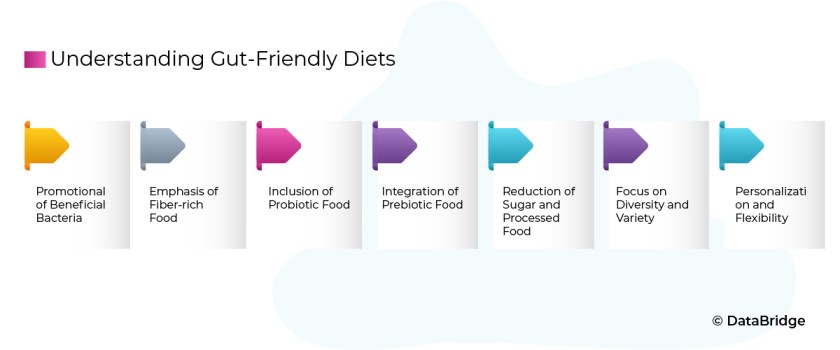May 21, 2024
Introduction
In recent years, there has been a significant shift in consumer attitude towards prioritizing digestive health. This change is marked by the increasing acceptance and adoption of gut-friendly diets. With growing awareness of the complex connection between gut health and overall well-being, consumers are seeking dietary choices that support and nourish their digestive systems. This whitepaper explores the emerging trend of gut-friendly diets, its underlying principles, benefits, and implications for both consumers and the food industry.
The digestive system plays a crucial role in maintaining our health and vitality. Apart from its main role in digestion and nutrient absorption, recent studies indicate that the gut microbiota, a varied population of microorganisms living in the gastrointestinal tract, has additional functions andprofoundly influences various aspects of health, including immune function, mood regulation, and even cognitive health. As awareness of this intricate gut-brain connection grows, so does the interest in adopting dietary habits that promote a healthy gut environment.
Understanding Gut-Friendly Diets

Gut-friendly diets have gained traction as an approach to support digestive health and overall well-being. Fundamentally, these dietary approaches prioritize the cultivation of the gut microbiota, which comprises a diverse array of microorganisms inhabiting the gastrointestinal tract. Understanding the principles that underpin gut-friendly diets is crucial for those looking to optimize their digestive health.
Understanding gut-friendly diets involves recognizing the importance of nourishing gut microbiota through the consumption of fiber-rich, probiotic, and prebiotic foods, while minimizing intake of sugars and processed foods. By adopting these dietary principles, individuals can support digestive health, promote a balanced gut microbiota, and contribute to overall well-being.
Benefits Associated with Gut-Friendly Diets

Embracing a gut-friendly diet yields multifaceted advantages, spanning from enhanced digestion to fortified immunity and uplifted mental well-being. Enriched with fiber, probiotics, and prebiotics, such diets promote a thriving gut microbiome, thereby improving digestive processes, bolstering the body's defense against pathogens, and potentially easing mental health issues. Adopting a gut-friendly diet offers numerous potential benefits for overall health and well-being, including:
Strategies for Consumers and the Food Industry: Navigating the Rise of Gut-Friendly Diets

The growing embrace of gut-friendly diets necessitates customized strategies from both consumers and the food industry. Consumers require clear education and transparent labeling to make informed choices, while the industry is called upon to create innovative probiotic-rich products and uphold rigorous quality standards. This collaborative effort promotes a harmonious connection between dietary awareness and product advancement. As digestive health gains prominence, cooperation among stakeholders becomes imperative to meet shifting preferences and provide reliable gut-friendly solutions. The growing acceptance of gut-friendly diets presents both opportunities and challenges for consumers and the food industry. Let's delve into real-world instances to illustrate these implications:
Consumer Education: In response to increasing interest in gut health, companies suchas Nestlé Health Science have launched educational initiatives to empower consumers with knowledge about gut-friendly diets. Nestlé's Gut Health Initiative provides online resources, webinars, and interactive tools to help individuals understand the role of nutrition in supporting digestive health. By collaborating with healthcare professionals and leveraging digital platforms, Nestlé aims to educate consumers about the principles and benefits of gut-friendly diets, thereby fostering informed dietary choices.
Beyond corporate initiatives, grassroots movements and influencers are also playing a pivotal role in educating consumers about gut-friendly diets. For instance, renowned nutritionists and wellness advocates collaborate with social media platforms to disseminate evidence-based information and practical tips for improving gut health. Platforms such as Instagram and Facebook have become hubs for sharing recipes, meal prep ideas, and educational content related to gut-friendly eating habits.
Moreover, community-based organizations and non-profit groups organize workshops, seminars, and cooking classes focused on gut health. For instance, the Gut Foundation, a non-profit organization dedicated to promoting digestive health, partners with local communities to host interactive events where participants learn about the importance of dietary fiber, probiotics, and fermented foods in supporting gut microbiota diversity.
Product Innovation: Food manufacturers are actively developing and marketing products that cater to the growing demand for gut-friendly options. For instance, Danone, a global leader in dairy products, introduced Activia Probiotic Dailies, a convenient probiotic beverage designed to support digestive health on-the-go. By incorporating probiotics into a portable format, Danone addresses consumers' desire for convenient and accessible gut-friendly options that fit into their busy lifestyles.
Similarly, Kellogg's launched a line of fiber-rich snacks under its Special K brand, featuring whole grains, nuts, and seeds to provide a satisfying source of dietary fiber. These innovative products align with the principles of gut-friendly diets by promoting fiber intake, which supports a healthy gut microbiota and digestive function.
Innovative startups are disrupting the food industry with novel gut-friendly products that appeal to health-conscious consumers. For instance, companies such as Farmhouse Culture specialize in producing artisanal fermented foods such as sauerkraut, kimchi, and probiotic-rich beverages. By leveraging traditional fermentation techniques and locally sourced ingredients, Farmhouse Culture offers consumers a wide range of flavorful options that not only taste delicious but also contribute to a balanced gut microbiome.
Additionally, technology-driven startups are developing personalized nutrition solutions tailored to individual gut health profiles. For instance, Viome, a biotechnology company, offers gut microbiome testing kits paired with personalized dietary recommendations based on microbial analysis. By harnessing the power of artificial intelligence and big data analytics, Viome empowers consumers to make informed dietary choices that optimize gut health and overall wellness.
Labeling and Certification: Clear labeling and certification schemes play a crucial role in helping consumers identify gut-friendly products amidst a crowded marketplace. For instance, the "Gut Health Certified" seal, established by a consortium of nutrition experts and food scientists, signifies that a product meets specific criteria for promoting digestive health. Companies such as General Mills have embraced this initiative by obtaining Gut Health Certification for select products within their portfolio, including yogurt, cereal, and snack bars. By prominently displaying the certification on packaging, General Mills provides consumers with assurance of product quality and efficacy in supporting gut health.
In response to consumer demand for transparency and authenticity, industry organizations are establishing rigorous standards for gut-friendly product labeling and certification. For instance, the International Scientific Association for Probiotics and Prebiotics (ISAPP) collaborates with food manufacturers to develop science-based criteria for labeling products as probiotic-rich or prebiotic-enhanced. Companies that meet these standards can display the ISAPP certification logo on their packaging, signifying their commitment to quality and efficacy in supporting gut health.
Moreover, retailers are increasingly prioritizing gut-friendly products in their assortments and providing educational materials to shoppers. Whole Foods Market, for instance, features a dedicated section in its stores highlighting gut-friendly foods and beverages, accompanied by informational signage explaining the benefits of probiotics, fiber, and fermented foods. By curating a selection of trusted products and offering educational resources, retailers empower consumers to make informed purchasing decisions that prioritize gut health.
Research and Development: Ongoing research into the interplay between diet, gut microbiota, and health outcomes drives innovation in gut-friendly foods and dietary interventions. For instance, PepsiCo's research and development team collaborates with leading academic institutions to explore the potential of prebiotic fibers in enhancing gut health. Leveraging insights from scientific studies, PepsiCo aims to develop novel food products fortified with prebiotic ingredients to support a balanced gut microbiota and improve digestive well-being.
Collaborative research efforts between academia and industry drive innovation in gut-friendly foods and dietary interventions.
For instance, universities partner with food companies to conduct clinical trials evaluating the efficacy of probiotic strains in improving digestive health outcomes. By sharing resources and expertise, these collaborations accelerate the development of evidence-based solutions that address consumer needs and preferences.
Furthermore, investments in biotechnology and food science enable companies to explore cutting-edge technologies for enhancing gut-friendly product formulations. For example, biotech startups are engineering novel probiotic strains with enhanced survivability anad functionality in the gut environment. By leveraging genetic engineering techniques and synthetic biology, these companies aim to develop next-generation probiotic products with targeted health benefits, such as immune modulation and inflammation reduction.
The landscape of gut-friendly diets is characterized by a dynamic interplay between consumer education, product innovation, labeling initiatives, and research endeavors. As awareness of the importance of gut health continues to grow, stakeholders across the food industry are collaborating to develop and promote solutions that empower consumers to prioritize digestive wellness in their dietary choices.
Conclusion
The increasing acceptance of gut-friendly diets underscores a fundamental shift towards prioritizing digestive health in the pursuit of overall well-being. By embracing dietary habits that nourish and balance the gut microbiota, consumers have the potential to enhance digestive function, bolster immune resilience, and foster mental and emotional well-being. As this trend gains momentum, collaboration among consumers, healthcare professionals, and the food industry becomes paramount in deepening our understanding of gut health and ensuring widespread access to gut-friendly dietary choices.
By working together, stakeholders can continue to advance research, innovate product offerings, and educate the public, empowering individuals to make informed decisions that promote optimal digestive wellness. Through this collective effort, we can navigate the complexities of the gut-brain axis and pave the way towards a healthier future for all.
DBMR has served more than 40% of Fortune 500 firms internationally and has a network of more than 5000 clients. Our Team would be happy to help you with your queries. Visit, https://www.databridgemarketresearch.com/contact
Contact UsCyber Security: Safeguarding User Data Online
Cyber Security: Safeguarding User Data Online
Cyber Security: Safeguarding User Data Online
Cyber Security: Safeguarding User Data Online
Cyber Security: Safeguarding User Data Online
We use cookies to improve your experience We use cookies to deliver the best possible experience on our website. To learn more, visit our Privacy Policy. By continuing to use this site, or closing this box, you consent to our use of cookies. Cookie Notice.